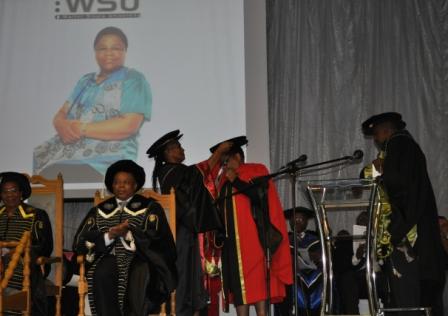
Walter Sisulu University yesterday (3 May) conferred the degree of Doctor of Science Honoris Causa on Professor Tebello Nyokong at its Faculty of Science, Engineering & Technology Graduation ceremony held at Buffalo City.
Nyokong, professor of Medicinal Chemistry and Nanotechnology at Rhodes, is no stranger to being honoured. She was bestowed with the Order of Mapungubwe: Bronze by the State President Thabo Mbeki in 2005.
Among the many other awards received during 2009 was the L’Oreal-UNESCO award for “Women in Science” as a Laureate representing Africa and the Arab States and was recognised by the NRF as one of the top three publishing scientists in South Africa.
She delivered a rousing and well received speech to the graduating students and their families at Walter Sisulu University. In congratulating the graduates and diploma and certificate recipients, she implored them to support their university financially as their careers take off.
Prof Nyokong urged students to help others to achieve what they had received, particularly those with science and mathematics skills, remembering those who had helped them achieve. She acknowledged and thanked the families, particularly those who believed in the education of female students.
Her advice to science graduates was to make science real and accessible to communities; and that students should consider a higher degree while they were young, and to resist being tempted into the job market when they had opportunities for further their education.
Referring to her own education opportunities, she emphasised that learners should be in class making the most of the opportunities they had no matter what these were, and not demonstrating out in the street. She herself had gone to school under a tree in Lesotho.
She gave credit to her team, who had believed in her long before it was fashionable to believe in a black woman scientist. She also gave credit to the South African government for supporting research, noting that few governments in Africa do this.
“As long as we have world class research facilities in South Africa”, she said, “Great minds will travel here to work with us”. She issued a warning however, that increasing bureaucracy gets in the way of research performance.
Prof Nyokong implored young people not to join the tendency towards negativity in South Africa, noting that everyone can make a positive difference. And she admonished those graduating to be humble, despite their achievements, and to remain connected to their communities. “Be dedicated in your careers,” she advised, “Avoid attitudes of entitlement, and be proud to be South African.”
